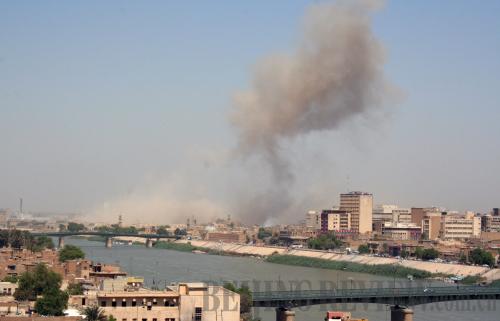|
 |
|
SMOKE OF TERROR: A plume of smoke rises into the sky following a suicide bombing attack in eastern Baghdad on September 5. Iraq remains volatile after the official end of the U.S. combat mission (XINHUA/AFP) |
In the future, Iraq will remain a weak country. It will be difficult for it to recover its status as a regional power or to become the bulwark the United States hoped for. In addition, Iraq's slow economic reconstruction and stagnant oil production conflict with the United States' pre-war hopes.
Geopolitical backlash
Worse still, the war destroyed the United States' once-favorable geopolitical situation in the Middle East. The United States is essentially a sea power far from Eurasia. Therefore, the most prominent role it can play in the continent is that of an offshore balancer. For years, the United States has pursued a Middle East policy encouraging regional countries to apply checks and balances to each other.
In the Persian Gulf, a region with the world's richest oil reserves, the United States adopted a policy of dividing instead of conquering. Iran and Iraq are major powers in the gulf and both of them could dominate the region. Therefore, the policy of the United States was to prevent either from becoming stronger than the other. That was partly why the United States launched the Gulf War in 1991.
But the Iraq War it launched more than a decade later was different; it was a war aimed at conquering. Like a bull in a china shop, the United States seriously damaged the fragile balance in the Middle East. With the fall of Saddam Hussein's regime, Iran lost its natural enemy. Following that, Shiites rose in Iraq and created a "Shiite crescent" in the Middle East, covering Iran, Iraq, Syria and Lebanon. This provided potential allies, as well as a broad buffer zone, for the rise of Iran.
With no power to balance it, Iran could become the decider of the Middle East's destiny. The United States would therefore face a more difficult question: how can it deal with Iran? With the Iraq War, the United States' geopolitical environment in the Middle East has not improved, but worsened. This point alone proves the war is not a success.
Lessons to learn
Reviewing this bitter experience, the United States should reconsider at least two questions.
First, it should reexamine the legitimacy of the war. Neither basis the United States gave for the war—Iraq's possession of weapons of mass destruction and its connection to terrorism—proved true. The war quickly lost its legitimacy. This damaged U.S. image and raised the cost of war.
The United States not only bore the direct cost of the war, but also had to bribe its follower countries. In addition, it had to handle problems with the American soldiers, such as high suicide rates and stress disorders.
Second, the United States should realize its military power is limited. After the Cold War, the United States became the world's only superpower. Its foreign policies have demonstrated increasing preemptive tendencies. The painful reality of Afghanistan and Iraq proved that the United States is far from omnipotent. These two wars, in Afghanistan and Iraq, have gradually turned the United States to a "paper tiger."
U.S. citizens have started reflecting, too. Last year, the Pew Research Center—which describes itself as a "nonpartisan fact tank that provides information on the issues, attitudes and trends shaping America"—said 49 percent of Americans feel the United States should "mind its own business internationally" and let other countries get along the best they can on their own.
Perhaps the painful experience in Iraq can help the United States change its attitude toward preemptive strikes and force it to adopt a different way of treating the world.
The author is a researcher with the China Institutes of Contemporary International Relations
| 